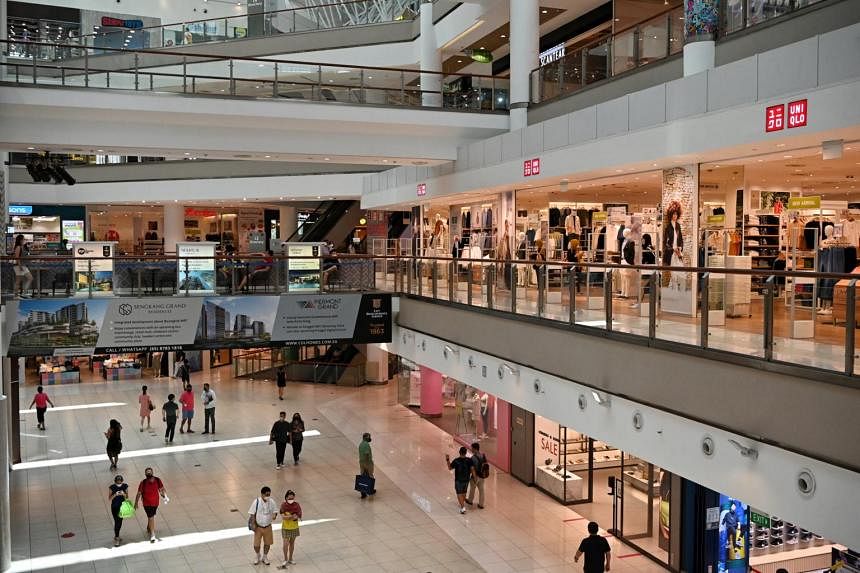SINGAPORE - Takings at the till in Singapore grew at a slower pace in June as inflation that month touched its highest levels since 2008, with analysts cautioning that growth could slow down in the coming months.
Retail sales rose 14.8 per cent year on year, cooling from the 17.8 per cent growth in May, according to figures released by the Department of Statistics (SingStat) on Friday (Aug 5).
The latest figure fell short of the expectations of analysts polled by Bloomberg, who projected sales to grow by 18.3 per cent.
Excluding motor vehicles, year-on-year growth came in at 19.8 per cent.
Retail sales, when compared with May and seasonally adjusted, fell 1.4 per cent in June. Sales dipped month on month for many categories, with the largest drops coming from more big-ticket and can-do-without items like computers and smartphones, furniture and household equipment, and recreational products.
RHB senior economist Barnabas Gan said the year-on-year expansion in retail sales seems like good news on the surface.
“However, what concerns us is the contraction in sequential growth, suggesting that some dissipation of consumer demand coupled with inflationary concerns have been observed,” he said.
The bank expects the retail sales momentum to slow further in the second half of the year and even contract in the fourth quarter on the back of higher inflation. Its forecast is for retail sales to grow by 10 per cent in 2022, down from last year’s 11.1 per cent expansion.
Ms Selena Ling, chief economist and head of treasury research and strategy at OCBC Bank, noted that the month-on-month drop in June’s retail sales comes after three consecutive months of growth.
This could be a sign that consumers are starting to be more cautious owing to heightened geopolitical tensions and global recession fears, she said.
“Inflation is definitely a concern, especially if higher prices for essentials imply a tightening of belts for lower-income households, particularly if wages have not kept pace,” she added.
UOB senior economist Alvin Liew said the weaker numbers could have been due to more households going on overseas holidays in June, resulting in lower expenditure here.
The slowdown in retail sales comes as core inflation, which excludes costs of private transport and accommodation, went up to 4.4 per cent in June.
Driven by higher prices of food, retail and utilities, core inflation touched its highest level since November 2008.
UOB’s Mr Liew said retailers here will likely get a boost from major events such as the Formula One night race in September, and last year’s low base will continue to lift growth in retail sales in the coming months.
But he also cautioned that elevated commodity price pressures, especially on energy and food, will feed into higher prices.
These will eat into the average household’s disposable income and reduce their spending on discretionary items, he said.
SingStat said the year-on-year growth in June retail sales was mainly due to a low base in the same month last year, when measures such as international travel restrictions were in place.
But seven of the 14 categories saw slower year-on-year growth in sales compared with May. Four categories also experienced lower sales in June from a year ago.
Sales at supermarkets and hypermarkets slid 11.3 per cent, while takings at minimarts and convenience stores fell 4.9 per cent. This was due to higher demand for groceries in June 2021 as more people stayed home with working from home the default arrangement under heightened alert measures.
Motor vehicle sales dropped by 11.4 per cent amid a lower certificate of entitlement quota this year, while sales of furniture and household equipment dipped by 0.4 per cent.
Sales of apparel and footwear jumped 92.4 per cent, compared with 99.8 per cent the previous month.
Sales at department stores rose by 57.8 per cent in June, falling from the 73.2 per cent growth in May, while watches and jewellery saw sales increase by 53.6 per cent versus May’s 60.1 per cent.
Meanwhile, the sales of food and beverage services grew by 59.1 per cent year on year in June, gaining speed from the 40.1 per cent increase in May.
Overall, the estimated total retail sales value in June was $3.8 billion, of which online sales made up an estimated 12.7 per cent.


